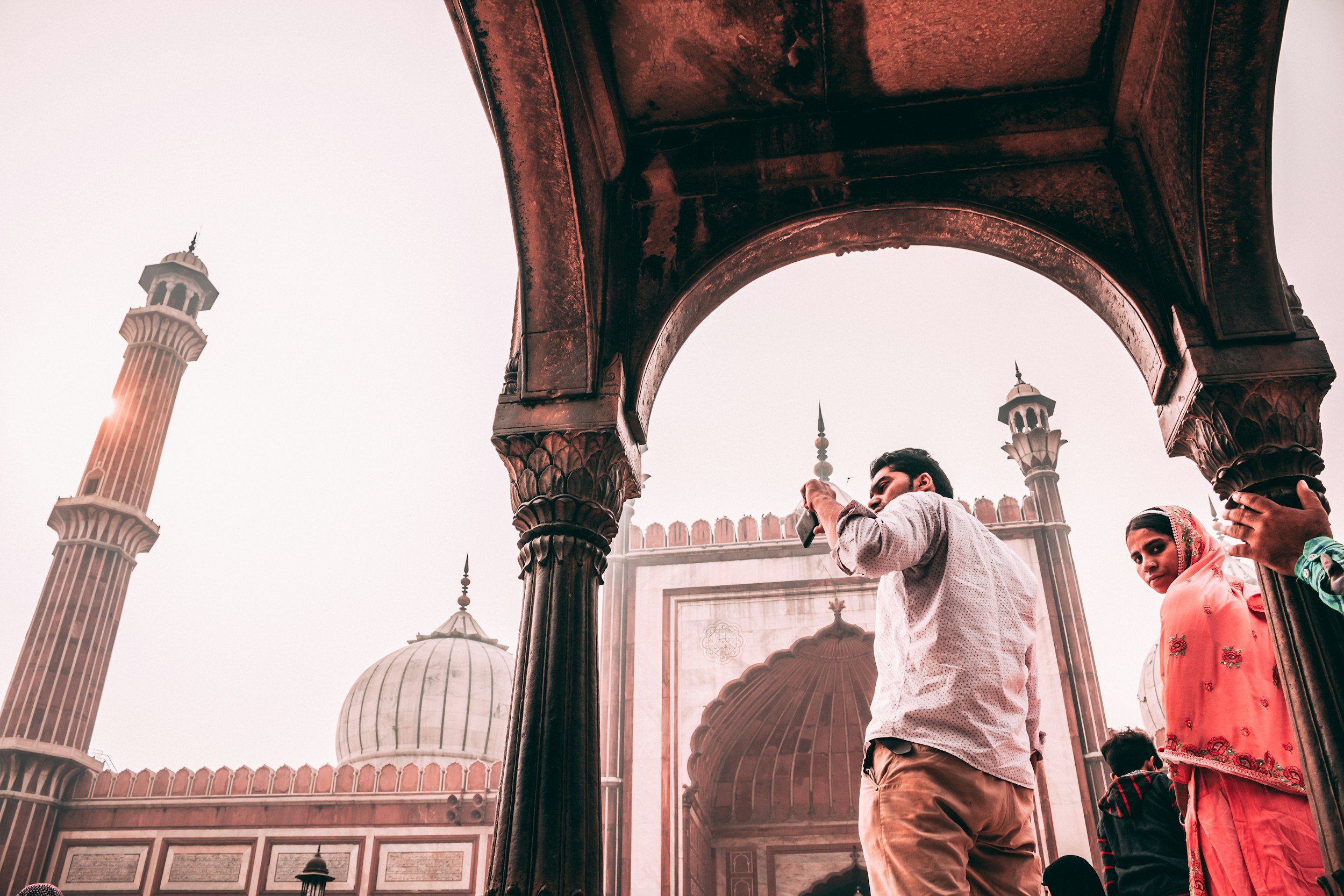
Going South

About the Podcast
Welcome to Going South, where we explore the complexities of South Asia—its cultures, histories, and politics.
Hosted by Ria Chakrabarty, Senior Policy Director at Hindus for Human Rights, this podcast brings together experts to unpack topics like human rights, interfaith peacebuilding, constitutional freedoms, and extremism.
With expert insights and accessible conversations, Going South offers a fresh perspective on the interconnected realities of South Asia and its diaspora.
Join us as we navigate the intersections of tradition, modernity, and justice.
Find our most recent episodes below - complete with a reading list of resources discussed/mentioned in the episode. If you can’t find or access anything, reach out to us at podcast@hindusforhumanrights.org.

Going South Podcast: Episode Four
Anuradha Basin and Kashmir Today
In this episode, we speak with Anuradha Bhasin, Executive Editor of the Kashmir Times, about the history of Indian-administered Kashmir. In the aftermath of the Pahalgam attack, the Government of India has cracked down on dissent in Kashmir.
We discuss the history of Kashmir’s relationship with India and Pakistan, the syncretic nature of Kashmiri society, and how the current human rights crisis came to be. Anuradha brings her extensive experience reporting on issues in Kashmir to give us a glimpse into how Kashmiris navigate living in one of the world's most contested regions.
Reading List
“A Dismantled State: The Untold Story of Kashmir After Article 370” - Anuradha Bhasin.
You can find all 25 banned books in this Al Jazeera article
“Sheikh Abdullah: The Caged Lion of Kashmir” - Chitralekha Zutshi
Haider (2014). Vishal Bhardwaj.
Maagh (2022). Aamir Bashir.
Harud (2023). Aamir Bashir

Going South Podcast: Episode Three
The Indian Electoral System in Crisis: Ayush Tiwari
In this episode, we speak with journalist Ayush Tiwari about how Indians participate in the voting process and the challenges they face. Our conversation comes as journalists, activists, and politicians raise serious questions about the integrity of the election process, particularly the Election Commission of India. We discuss the basics of the voting process, the complaints made by opposition parties, and current concerns about voter suppression in India’s second-largest state, Bihar. Ayush brings his insights from his ground reporting in this timely discussion about how the Indian government’s attacks on democracy are affecting Indians’ fundamental right to choose their leaders.
AN UPDATE: In the time between recording and publishing this episode, a wave of new allegations of electoral fraud has emerged, including an investigation by Scroll into allegations of election fraud in the state of Uttar Pradesh. We will release an update on this topic in the coming weeks, once the dust settles from what continues to be a dynamic issue.
Biography
Ayush Tiwari is an investigative journalist who has reported on various aspects of Indian democracy and human rights, including majoritarianism nationwide, the human rights situation in Kashmir, and the impact of COVID-19 on Indian society. He has previously written for Newslaundry and The Morning Context. He currently writes for Scroll, where he covers voter suppression and the erosion of the Election Commission of India's credibility.
Ayush’s Work
Voters alleged election fraud in UP bye-poll. Now data mirrors their claims - Ayush Tiwari & Aryan Mahtta
We went to a polling booth with one of the highest deletions in Bihar: here’s what we found - Ayush Tiwari, and Aryan Mahtta, Scroll
EC began Bihar roll revision without data and shifted goal posts midway, court document shows- Ayush Tiwari, Scroll
Reading List
Electoral Irregularities in the World’s Largest Democracy - Sabyasachi Das
“Manual on Electoral Rolls” and “Handbook for Returning Officer” - Election Commission of India
Assessing the Integrity of India’s 2024 Lok Sabha Elections - Milan Vaishnav
The Verdict: Decoding India's Elections - Prannoy Roy & Dorab R. Sopariwala
Why India’s Election Commission is facing a test of credibility - Nikhil Inamdar, BBC
ECI Skipped its Fraud-Busting Software, Flooding Bihar Voter Roll With Lakhs of Suspect Duplicates -Ayushi Kar, and Vishnu Narayan, Reporters’ Collective
Guide to the 2024 Indian Elections - Hindus for Human Rights
India After Gandhi - Ramchandra Guha
Freedom at Midnight

Going South Podcast: Episode Two
Arpeeta Shams Mizan and Human Rights in Bangladesh
In this episode of Going South, we talk to legal scholar Arpeeta Shams Mizan about Bangladesh as it enters a new era. In this episode, we discuss the legacies of genocide and colonialism on the people of Bangladesh today, and how mass movements, in particular, have driven the country forward. Mizan provides compelling insights into the experiences of Bangladesh’s cultural and religious minorities, and argues that Bangladesh must shake off its colonial legacies to truly build an inclusive society. Join us for a wide-ranging discussion about how Bangladesh’s history informs its current challenges and future possibilities.
Reading List
“The Cruel Birth of Bangladesh” - Archer K. Blood: On the genocide in Bangladesh unleashed by the Pakistan military during ‘Operation Searchlight’, and the liberation of Bangladesh
“Bangladesh: Legacy of Blood” - Anthony Mascarenhas: A oral history and archival study of Bangladesh’s independence and the first 10 years of the new nation
“A History of Bangladesh” - Willem Van Schendel : A history of the rise of the land and culture of Bangladesh through ecological disasters, colonial history and post-colonial independence struggle
“Ekattorer Dingulee” (The Days of ‘71) - Jahanara Imam: An eyewitness account of Bangladesh’s 9 month long and brutal independence struggle
“Ekattorer Diary” (The Diary of 1971) - Sufia Kamal: An account of the horrors of the 1971 liberation struggle of Bangladesh
“The Golden Age: A Novel” - Tahmima Anam: A fictional account of the liberation struggle told through the eyes of a young widow’s lens
“The Blood Telegram: Nixon, Kissinger and a Forgotten Genocide” - Gary J. Bass: The larger Realpolitik of the cold war, personal hostilities between heads of state, and clandestine politics in South Asia that shaped the 1971 liberation struggle

Going South Podcast: Episode One
Aakar Patel on India’s Democratic Decline and Human Rights Struggles
In this inaugural episode of Going South, we delve deep into the evolving socio-political landscape of India with Aakar Patel, renowned journalist, author, and human rights advocate. From his incisive critique of India's shift toward Hindu majoritarianism in Our Hindu Rashtra to the metrics of democratic decline detailed in Price of the Modi Years, Patel provides a compelling overview of a nation at a crossroads.
The conversation explores the structural transformation of India’s democracy, the weaponization of laws like UAPA and anti-conversion statutes, and the erosion of freedoms under a growing ethnonationalist agenda. Patel shares his personal experience leading Amnesty International India through a period of unprecedented state crackdowns on civil society, including the forced closure of its operations.
This episode also addresses the global ramifications of India’s political trajectory, its reception in international fora, and the challenges faced by the diaspora advocating for human rights. Through Patel’s insights, we examine the broader implications of these developments on freedoms of expression, movement, and religious practice, alongside a critical look at recent criminal code reforms.
Join us for an eye-opening discussion about India’s present and future, set against the backdrop of elections, human rights struggles, and international diplomacy.
Bio: Aakar Patel is an Indian journalist, author and social activist. He was the head of Amnesty India between 2015 and 2019 and since then has been the Chair of Amnesty International’s Board in India. His book, Price of the Modi Years has become a popular socio-economic entry point to understand ‘Modinomics’. In his first book, Our Hindu Rashtra: What It Is. How We Got Here he talks about the arrival a Hindu majoritarian India using its existing constitutional apparatus. As a journalist, Aakar has written pieces reflecting on the declining state of India’s institutions, attacks on civil society, state of human rights and regressing democracy. His works have appeared in several notable platforms like The Wire, Livemint, National Herald and Business Standard.
Reading List
House Resolution 745 - 116th Congress (2019-2020): Urging the Republic of India to end the restrictions on communications and mass detentions in Jammu and Kashmir as swiftly as possible and preserve religious freedom for all residents.
Library of Congress, State Anti-Conversion Laws in India: India’s Freedom of Religion Acts or “anti-conversion” laws are state-level statutes that have been enacted to regulate religious conversions. The laws are in force in eight out of twenty-nine states: Arunachal Pradesh, Odisha, Madhya Pradesh, Chhattisgarh, Gujarat, Himachal Pradesh, Jharkhand, and Uttarakhand.
The Guardian, “Amnesty to halt work in India due to government witch hunt”: in 2020 Amnesty International India halted its work in the country and laid off all its staff after its bank accounts were frozen amid constant harassment from the Home Ministry of India.
European Parliament, Motion for a Resolution on India’s Citizenship Amendment (Act): The motion called to recognize the international law violations as visible in the text of the Citizenship Amendment (Act), and the crackdown of the Modi government.
Office of the United Nations High Commissioner for Human Rights Report on the Situation of Human Rights in Kashmir: Developments in the Indian State of Jammu and Kashmir from June 2016 to April 2018, and General Human Rights Concerns in Azad Jammu and Kashmir and Gilgit-Baltistan:This report covers both the Indian state of Jammu and Kashmir (consisting of the Kashmir Valley, the Jammu and Ladakh regions) and Pakistan-Administered Kashmir (Azad Jammu and Kashmir and Gilgit-Baltistan). The focus of the report is on the situation of human rights in the Indian state of Jammu and Kashmir from July 2016 to April 2018 over which period allegations of widespread and serious human rights violations were received, notably excessive use of force by Indian security forces that led to numerous civilian casualties.
Office of the United Nations High Commissioner for Human Rights Update of the Situation of Human Rights in Indian-Administered Kashmir and Pakistan-Administered Kashmir from May 2018 to April 2019: This second report of the Office of the United Nations High Commissioner for Human Rights (OHCHR) on the situation of human rights in Indian-Administered Kashmir and Pakistan-Administered Kashmir covers the period from May 2018 to April 2019.
U.S. Department of State, International Religious Freedom Report: India (2023): The report covers the declining state of religious freedom in India, emphasising the adoption of ‘anti-conversion’ laws in 9 out of 28 Indian states.
U.S. Commission on International Religious Freedom, Annual Reports: This page follows annual reports of the USCIRF and its India chapters. From 2020, each USCIRF report has recommended the designation of India as a country of particular concern.
Aakar’s work
Why I Write: Essays By Saadat Hasan Manto (Tranquebar, 2014)
Our Hindu Rashtra: What It Is. How We Got Here (Westland, 2020)
Price of the Modi Years: A History of India Since 2014 (Westland, 2021)
